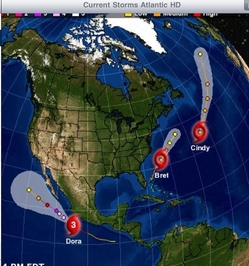 So far this year there have been four named storms to date. Any of these storms are strong enough to do significant damage. However, none of them caused any significant impact to South Florida.
So far this year there have been four named storms to date. Any of these storms are strong enough to do significant damage. However, none of them caused any significant impact to South Florida.
Now that South Florida is in the very height of hurricane season it serves as a reminder that tropical depressions are storms with winds of up to 38 mph and are identified only by numbers; tropical storms are given names and have winds form 39 to 73 mph and hurricanes have winds above 74 mph. And so far this year we have had 4 named storms.
From now through November, the chances are good that South Florida will be threatened by named tropical storms or hurricanes. Even a tropical depression can cause wind and water damage while serving as a health reminder that the time to prepare is now, before a serious storm is eminent.
For those who always seem too busy to prepare, our Miami storm damage attorneys recommend readying you and your family in several stages.
Always
-Know and understand your insurance policy, including your exposure to deductibles.
-Keep your important paperwork in water-proof storage containers
-Keep several plastic totes with the following items inside (and clearly marked in a checklist on the outside): manual can opener, disposable plates, silverware and cups, first aid kit, flashlights, battery-operated radio.
Start of hurricane season
-Purchase fresh batteries for radios and flashlights
-Ensure fresh gas is available for the generator and gas grill and that both are in good repair.
-Purchase fresh bottled water (at least 7 gallons per person — a gallon a day for a week). Buying 20 oz bottles will allow the water to be used at the beach or around the pool after hurricane season.
Hurricane Watch
If you have followed the instructions above, this will be your serious hurricane preparation and it should be pretty simple:
-Fill cars with gas.
-Go grocery shopping
-Gather specialty items, including pet care and child care items.
-Charge cell phones
-Gather rain gear, toys, books and games
-Ensure you have cash on hand to last several weeks.
Hurricane Warning
This means a hurricane is going to strike the area.
-Install storm shutters
-Remove patio furniture and other loose items, including planters, from the exterior of your home
-Ensure you have emergency contact information, including the location of the nearest shelter
-Listen to official instructions or advisories.
—–
EXTENDED BODY:
Consider Your Options. Contact Us Today.
Before opening our law firm in 2006, our attorneys worked for some of the state’s, and nation’s, largest law firms, and worked representing the insurance companies for years. Our attorneys are now uniquely positioned to use that experience to assist individuals and businesses alike throughout Florida with their insurance claims. As a result, our attorneys are well versed in the impact insurance has on businesses, condominiums, and individuals alike. Our insurance litigation practice group is prepared to tackle your insurance claim.
Given our extensive experience litigating for, and against, insurance companies, our insurance litigation practice group is prepared to provide aggressive, efficient and effective representation on a broad spectrum of insurance claims in Florida for local, national, and international clients. We are prepared to advocate insurance claims at the pre-suit stage, trial, appellate and arbitration levels.
If you are facing a dispute over an insurance claim in Florida, contact Alvarez & Barbara, LLP, for a free and confidential consultation to discuss your rights.
Call us today toll free at 1-866-518-2913 or at 305-263-7700.